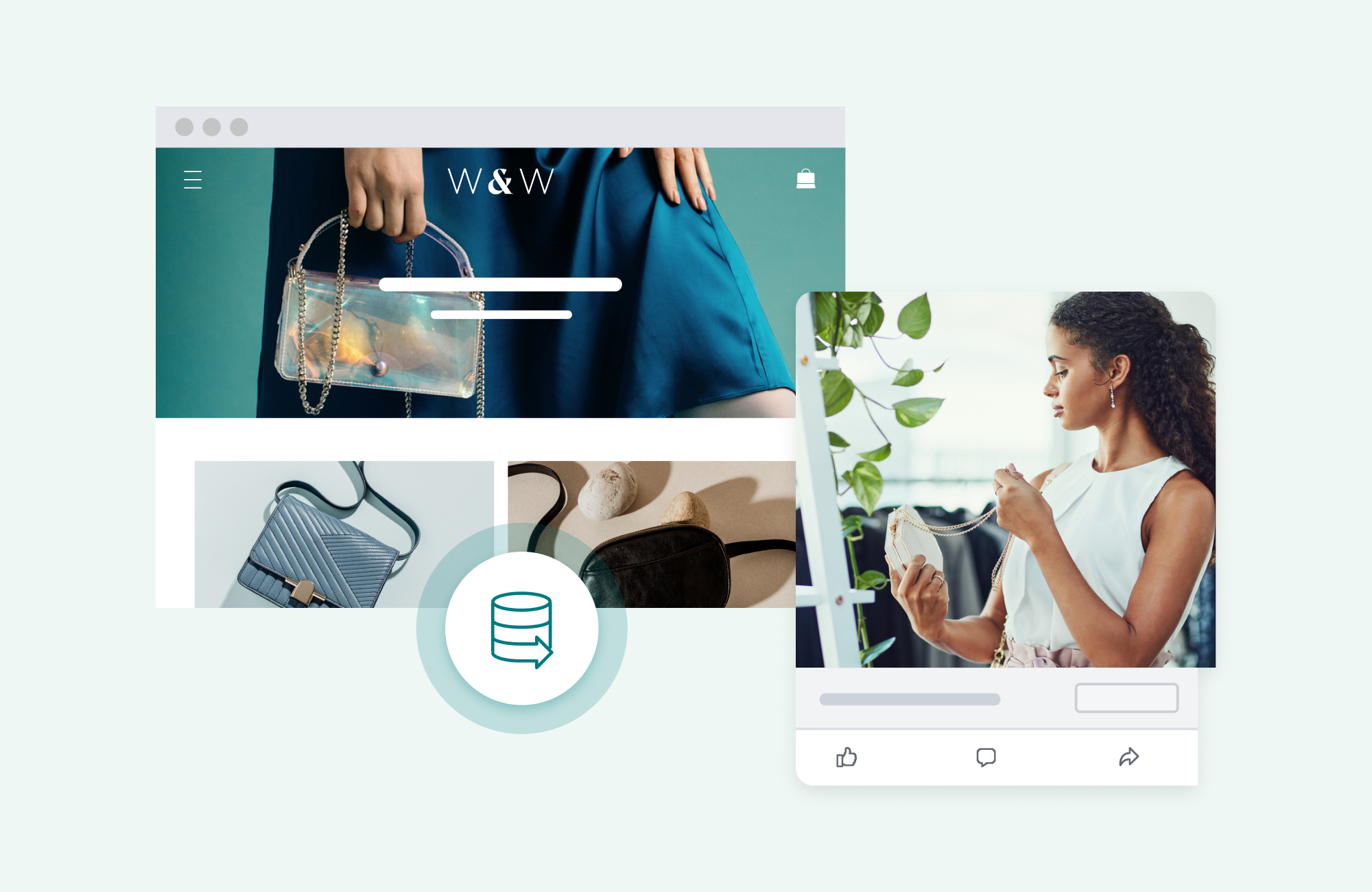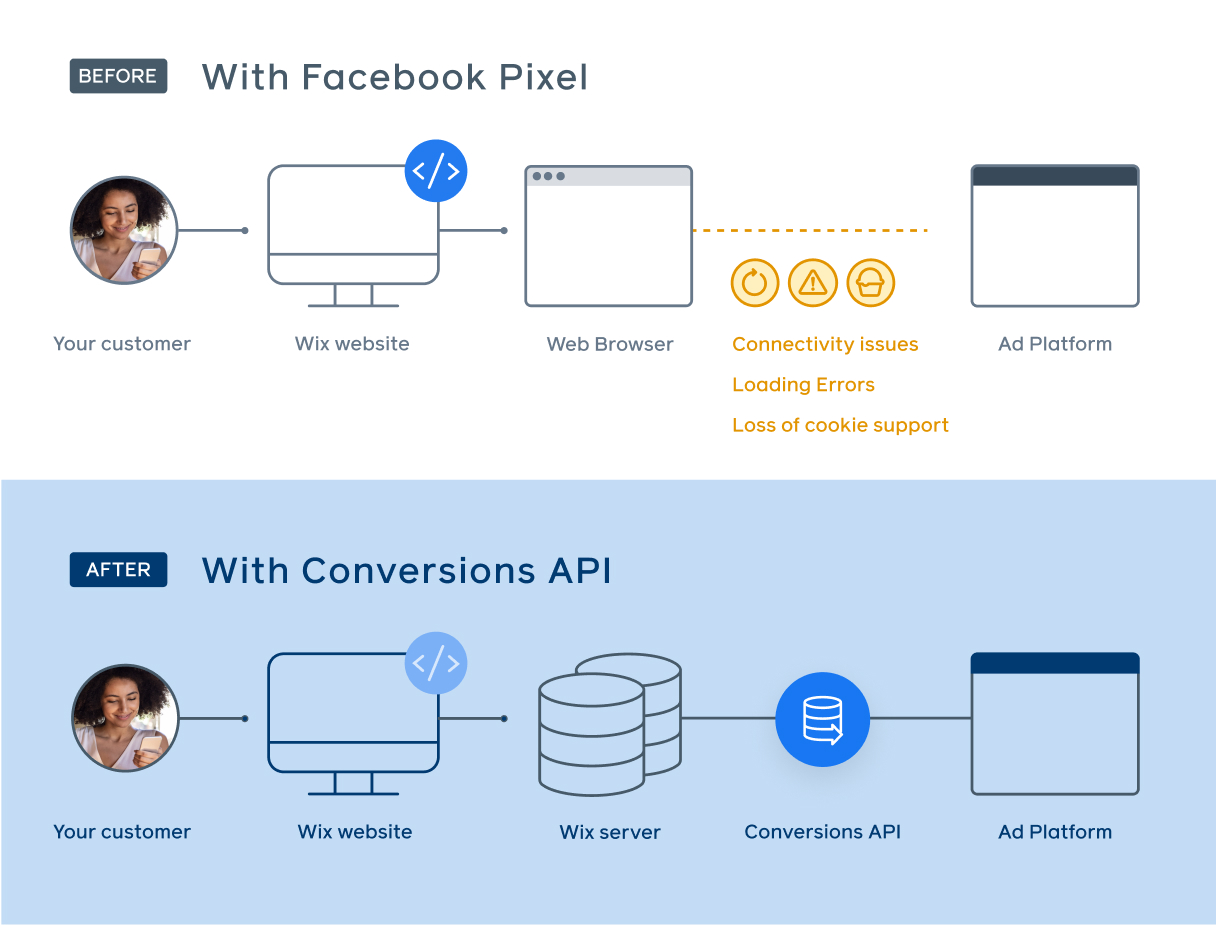Managing a great Facebook ad campaign got a lot harder starting in March 2021. We explain why, what solutions exist through the Conversions API to address the problem, and how to make the most of them. Let’s dive in!
What is the Conversions API?
To have ads run well, Facebook needs to understand who visits your site and ultimately, who makes a purchase. This allows their machine learning system to understand your target audience and find more people likely to buy. This became much harder to do when Apple’s iOS14 introduced consumer-first privacy filters in March 2021. This resulted in loss of data transferred back to Facebook from websites. In response to this, Facebook introduced the Conversion API (CAPI). The Conversions API is code you install on your website to send back data to Facebook when your website visitors view pages, click, or make a purchase. The Conversions API is similar in function to Facebook pixel tracking. But instead of sending data from a user’s browser it sends events server-to-server, passes along more information, and is less likely to have its data blocked.
 How did iOS14 impact Facebook ads and data?
How did iOS14 impact Facebook ads and data?
Before we dive further, it’s important to understand why Apple’s iOS14 was so devastating to Facebook ad performance. On the consumer side, iOS14 allowed users to opt-out of sharing data. It proactively asked them if they want out at the moment of installing or updating an app. This led to a 92% opt-out rate of tracking data from Facebook’s apps. To make matters worse, Facebook’s policy team decided to apply a single opt-out to all the data from a user, no matter the device. This means all data is dropped from an opted-out user, even when the data comes from a non-iOS device. Now more than 60% of all data sent to Facebook gets dropped. With lots of missing data, Facebook struggles to track all the purchases on a website, and struggles to know who made those purchases. This data loss issue has led to decreased performance and generally made Facebook’s machine learning systems stop working well. And Facebook ad buyers have less accurate information to make optimization decisions themselves.
Why was the Conversions API created?
This problem needed a solution and fast. This is where Facebook Conversions API comes in. At first, Facebook created it to connect Facebook to complex eCommerce websites with 1,000s of unique product pages. The Conversions API gave developers control over how to share data back to Facebook in real-time. For security purposes, all the data sent from the Conversions API needs to be de-identified. This made it a privacy-forward solution. As a result, it made it a near perfect solution to the challenge presented by iOS14.
 How does the Conversions API solve iOS 14 data loss?
How does the Conversions API solve iOS 14 data loss?
The Conversions API hands over control of data management and transfers it to website owners. This control also means that the website owners’ terms of service governs the data. The data is no longer dependent on Facebook’s terms of service. This removes the liability from Facebook. So data sent via the Conversions API is 100% compliant, usable, and unaffected by iOS14. Conversions API data transfers go from 40% successful back to 100% successful. More data equals better performance, better targeting, and better attribution. Further, website owners then have more precise control over what data gets shared back to Facebook. This is a huge bonus.
How to implement the Conversions API in Shopify in 3 settings?
Specific to Shopify, store owners have the ability to configure how much data is shared between their store and Facebook. These settings are found in the Facebook Sales Channel. Once data sharing is on, the store owner can choose between 3-levels of data sharing:
-
Conservative - This is the most basic level. The Facebook tracking pixel sends back browser events to Facebook. Note - the Conversion API is not on for this setting
-
Enhanced - At this next level, Shopify Conversions API connection sends back server events - improving performance.
-
Maximum - At this level, data modeling enhances performance further through predictive analytics by Facebook.
What’s wrong with the Shopify Conversion API connection?
Despite the Shopify Conversions API connection being easy to use, it’s not a solution to iOS 14 data loss. The ideal benefit of the Conversions API is precise control over what data Facebook receives and data governance under your own terms of service. Since Facebook developed and maintains the Shopify Conversions API, neither of these benefits are realized. For one, the Facebook terms of service applies to all data sent from the Shopify Conversions API. This makes the data subject to the same controls as Facebook pixel tracking. As such, any data that matches back to an opted-out user will be dropped. This lowers the value of the Shopify Conversions API connection. Also, Shopify sends Conversions API data in batches every few hours. This leads to lost opportunity from the benefit of real-time data.
Options to create a Robust Conversions API connection to Shopify
But have no fear! There are three solutions to consider:
- Facebook Custom CAPI: Facebook provides free tools and documentation that allows anyone to create their own Conversions API connection. But this requires significant technical expertise and time.
- Facebook CAPI Gateway: The CAPI Gateway is Facebook's attempt to simplify the process of creating a Conversions API connection. It still requires a high level of technical ability, but offers clear, prescriptive instructions.
- 3rd Party Tool: Finally, 3rd party platforms like Popsixle (hey, that’s us!), EdgeTag,and Elevar can simplify and/or automate the process of creating a Conversions API connection.
Interested in installing a robust Facebook Conversions API connection, without the need to be technical? Read why Popsixle is the easiest Conversions API option for Shopify stores.